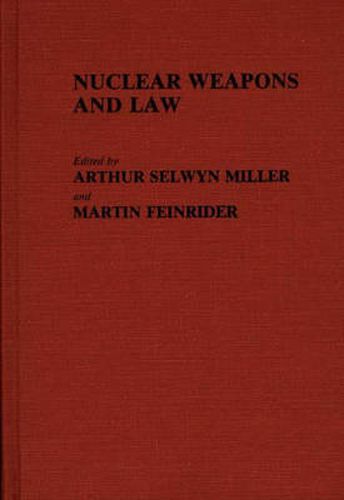Readings Newsletter
Become a Readings Member to make your shopping experience even easier.
Sign in or sign up for free!
You’re not far away from qualifying for FREE standard shipping within Australia
You’ve qualified for FREE standard shipping within Australia
The cart is loading…






This book presents a rounded critique of the conventional wisdom about the legality of nuclear weapons by experts in international and constitutional law. Part I addresses the status of nuclear weapons under international law. Scholars on one side of the question draw upon treaties and international custom to argue that most uses of nuclear weapons are illegal and that even mere possession of such weaponry is legally unjustifiable. Others argue that law cannot be imposed on the nuclear weapons states without their consent and that nuclear weapons provide deterrence that binds the superpowers in a peaceful balance of power. Part I concludes with a comprehensive bibliography on nuclear weapons and international law. Part II, the section that focuses on nuclear weapons and American constitutional law, offers widely divergent approaches and conclusions. Although there is no explicit prohibition of such weapons in the United States Constitution, several contributors suggest that the advent of nuclear weapons has so changed the milieu in which constitutional institutions operate that many accepted conclusions must be reexamined. Part III explores the effects of nuclear weapons on the environment and the medical consequences of nuclear war.
$9.00 standard shipping within Australia
FREE standard shipping within Australia for orders over $100.00
Express & International shipping calculated at checkout
This book presents a rounded critique of the conventional wisdom about the legality of nuclear weapons by experts in international and constitutional law. Part I addresses the status of nuclear weapons under international law. Scholars on one side of the question draw upon treaties and international custom to argue that most uses of nuclear weapons are illegal and that even mere possession of such weaponry is legally unjustifiable. Others argue that law cannot be imposed on the nuclear weapons states without their consent and that nuclear weapons provide deterrence that binds the superpowers in a peaceful balance of power. Part I concludes with a comprehensive bibliography on nuclear weapons and international law. Part II, the section that focuses on nuclear weapons and American constitutional law, offers widely divergent approaches and conclusions. Although there is no explicit prohibition of such weapons in the United States Constitution, several contributors suggest that the advent of nuclear weapons has so changed the milieu in which constitutional institutions operate that many accepted conclusions must be reexamined. Part III explores the effects of nuclear weapons on the environment and the medical consequences of nuclear war.